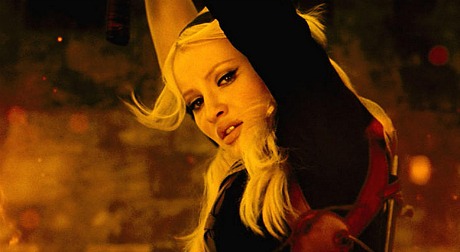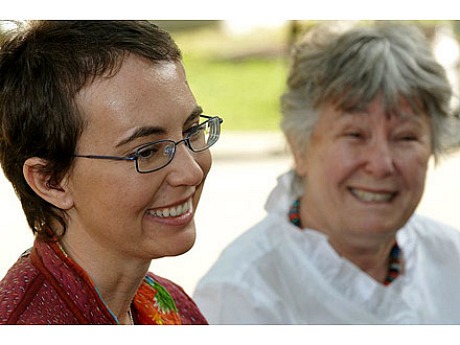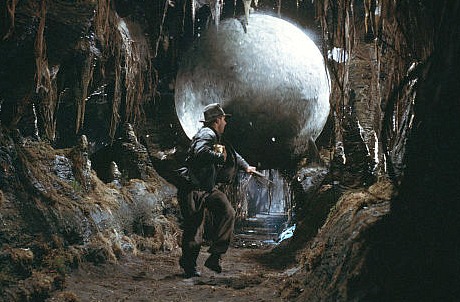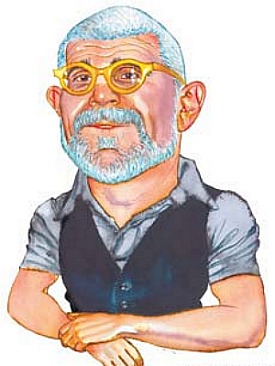N.Y. Times guys Michael Cieply and Brooks Barnes are reporting that the big studios are feeling a bit antsy about bringing their films to ComicCon 2011. Warner Bros., Disney, DreamWorks and the Weinstein Co. are sitting it out this year, and Marvel also might not attend.
This change-of-heart is essentially due to a conclusion, they say, that ComicCon buzz about this or that film, however enthusiastic it may be inside Hall H, is hermetic and unto itself and doesn’t translate to the general public. And if your movie tanks with the ComicCon crowd then you’re really in trouble.
I’ve been pushing a general assessment about ComicCon movies for some time now. Most of them, based on comic books and video games and smothered in CG-for-its-own-sake, are aimed at undiscriminating fan boys who will give almost any film a pass and a “whoo-hoo!” as long as it echoes or flatters or tips its hat toward their secular comic-book/superhero/cartoon-favoring fan consciousness.
A result is that filmmakers like Jon Favreau have become used to the idea of making fantasy, superhero and comic-book movies for the ComicCon faithful first and then the general public second, and so the plot-driven, character-driven and/or thematic-through-line standards that Joe Popcorn might want to see inserted into films are ignored for the most part. Because filmmakers know that the ComicCon fools will cheer them on no matter how shitty their films might actually be in the eyes of God.
The bottom line, for those who care to acknowledge it, is that most ComicCon movies blow because ComicCon attendees have no taste.
This isn’t because your typical ComicCon attendee is stupid. Far from it. It’s because a typical 2011 believer sees himself or herself as a kind of impassioned monk or follower or deacon or priestess, and judges movies on the basis of whether or not they cater to his/her geek theology and criteria. ComicCon used to be about the faithful celebrating decent, good or first-rate fantasy flicks, but the bigger ComicCon has become the more it’s been about Hollywood fantasy filmmakers catering to the hardcore wackazoids.
It’s become, in short, a totally corrupted dynamic, and fervent ComicCon boosters like Ed Douglas and Katey Rich and James Rocchi wouldn’t admit this if you strapped them down on a metal gurney and threatened to saw one of their arms off.
“A growing number of movie marketers are realizing” that Comic-Con “has turned into a treacherous place,” the article says. “Studios come seeking buzz, but the Comic-Con effect can be more negative than positive. The swarm of dedicated fans…can instantly sour on a film if it doesn’t like what it sees, leaving publicity teams with months of damaging web chatter to clean up.”
“Even a joyous reaction at Comic-Con, which takes place in San Diego from July 21 to 24, can skew expectations, as a platoon of studios learned last year, if hard-core enthusiasm doesn’t spill into the mainstream.”
Ground Control to Cieply/Barnes: If movies are tedious and stinky and pass along to the viewer a kind of swine-flu-in-the-bloodstream feeling, they won’t be well reviewed or be popular with Average Joes.
Ciepley and Barnes mention how ecstatic ComicCon reactions to Zack Snyder‘s Sucker Punch last summer weren’t echoed by Joe Popcorn types when it opened last March. That’s because Snyder’s imaginative compositional flourishes were overwhelmed by his attachment to deadly cliches and his mediocrity as a co-screenwriter. As I said in my review, Sucker Punch “is a digital torture device for those seeking at least a hint of compelling narrative, a tendril-ish remnant of logic, a tiny smidgen of story intelligence, and dialogue with a hint of flair or some kind of tethered-to-the-world normality.”
Disney spent millions on Tron: Legacy at Comic-Con, they report, but “a less-than-fantastic payoff” resulted when it opened last December. Uhm…could that be because it mostly stunk and because Garrett Hedlund‘s character was an idiot and because Hedlund exuded no charisma?
Lionsgate’s Buried “was promoted at ComicCon,” they write, “but the film sold just $1 million in tickets when it opened two months later.” Hello? Ryan Reynolds doesn’t get out of the coffin at the end! It’s a well-made movie about suffocating to death!
Scott Pilgrim vs. the World “was the big alarm,” they write. “That Universal movie was the belle of last year’s convention, and the studio spent heavily to make it so, draping the entire side of a skyscraper with an ad, for instance. Released just three weeks after the convention, Scott Pilgrim fizzled and the $60 million movie sold just $32 million in tickets.”
Yes! And what a glorious moment that was!









